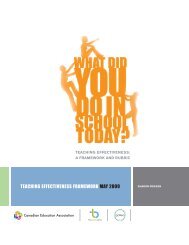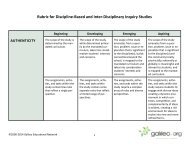Discipline-Based Inquiry Rubric - Galileo Educational Network
Discipline-Based Inquiry Rubric - Galileo Educational Network
Discipline-Based Inquiry Rubric - Galileo Educational Network
- No tags were found...
Create successful ePaper yourself
Turn your PDF publications into a flip-book with our unique Google optimized e-Paper software.
Beginning Developing Emerging AspiringCONNECTINGWITH EXPERTISEStudents hear or readabout relevant informationfrom the teacher, orresources provided by theteacher.Students engage withspeakers or interviewswith experts from outsidethe classroom.Students observe andinteract with adults withrelevant expertise andexperience in a variety ofsituations.Students engage withexperts and professionalsbeyond the classroom todeepen their understandingand improve theirperformance and product.The teacher designs thetask in isolation (withoutinput from external expertise).The teacher designs thetask in consultation withexpertise, either directlyor indirectly regarding thetopic for study.The teacher designs thetask in collaboration withexpertise, either directlyor indirectly. The studyrequires adults to collaboratewith one anotherand with students on thedesign and assessment ofthe study work.The teacher designs opportunitiesfor studentsto improve their work as aresult of connecting withexperts/expertise.©2000-2014 <strong>Galileo</strong> <strong>Educational</strong> <strong>Network</strong> 6
Beginning Developing Emerging AspiringELABORATEDFORMS OFCOMMUNICATIONStudents have little or noopportunity to discusstheir work with others.Students have opportunitiesto share their ideaswith each other.Students have opportunitiesto share ideas and tonegotiate the flow of conversationwithin small andlarge group discussions.Students have opportunitiesand are expected toengage in idea improvement;mirroring the workof disciplined thinkers ingathering and weighingevidence, and ensuringthat explanations coherewith all available evidence.Assignments, activities,and tasks require studentsto communicatewhat they are learning toa teacher audience (e.g.handing it in as an assignment).Assignments, activities,and tasks require studentsto communicate whatthey are learning with aclassroom audience.Assignments, activities,and tasks provide opportunitiesfor students tocommunicate what theyare learning with an audiencebeyond the classroom.Assignments, activities,and tasks require studentsto communicate theirlearning with audiencesappropriate to the discipline.Forms of communicationmeet school requirementsbut are disconnected fromthe discipline.Forms of communicationmeet school requirementsand somewhat resemblethose used in the discipline.Forms of communicationmeet school requirementsand resemble those usedin the discipline.Forms of communicationmeet school requirementsand effectively reflectthose used in the discipline.©2000-2014 <strong>Galileo</strong> <strong>Educational</strong> <strong>Network</strong> 7








